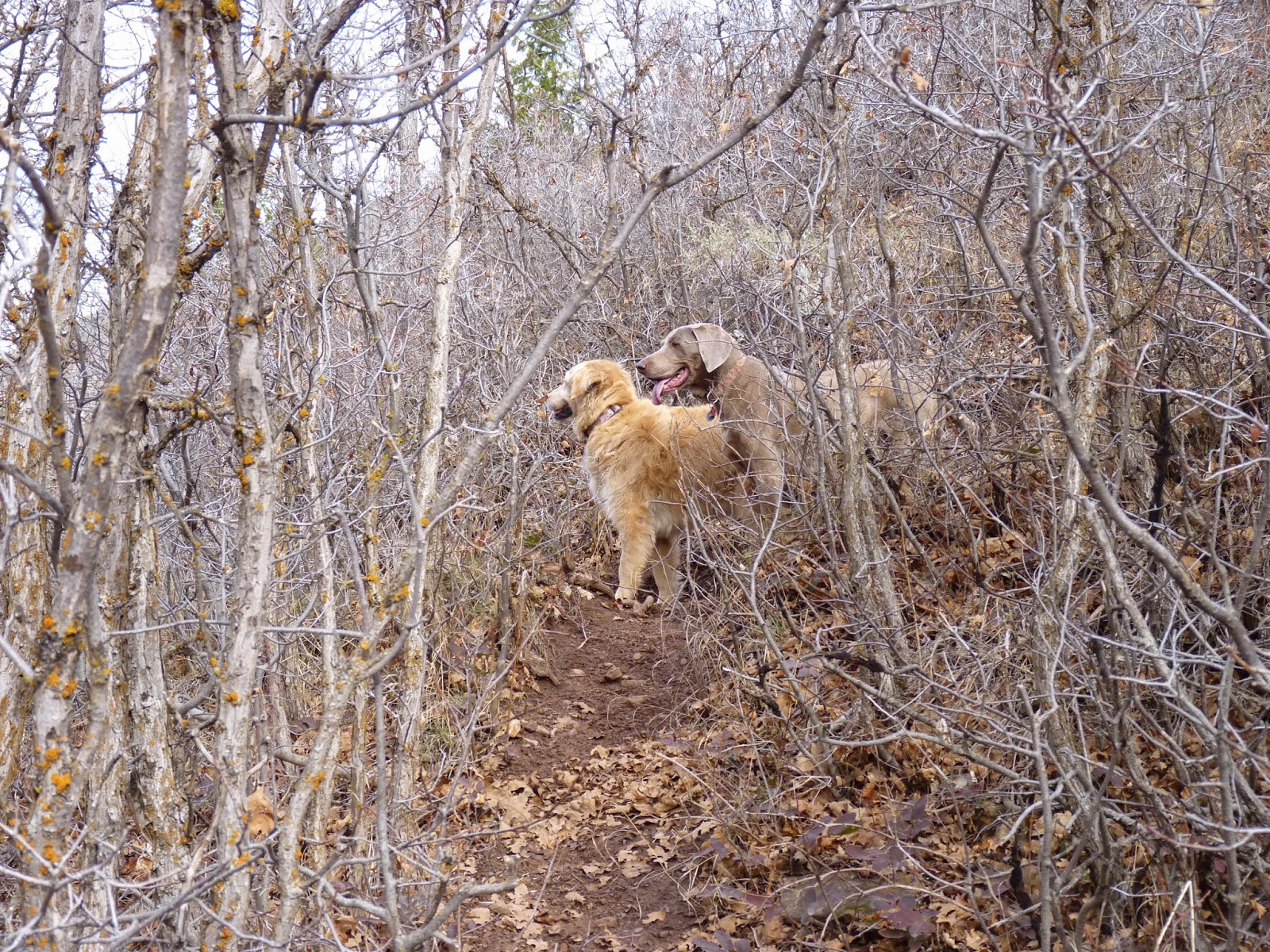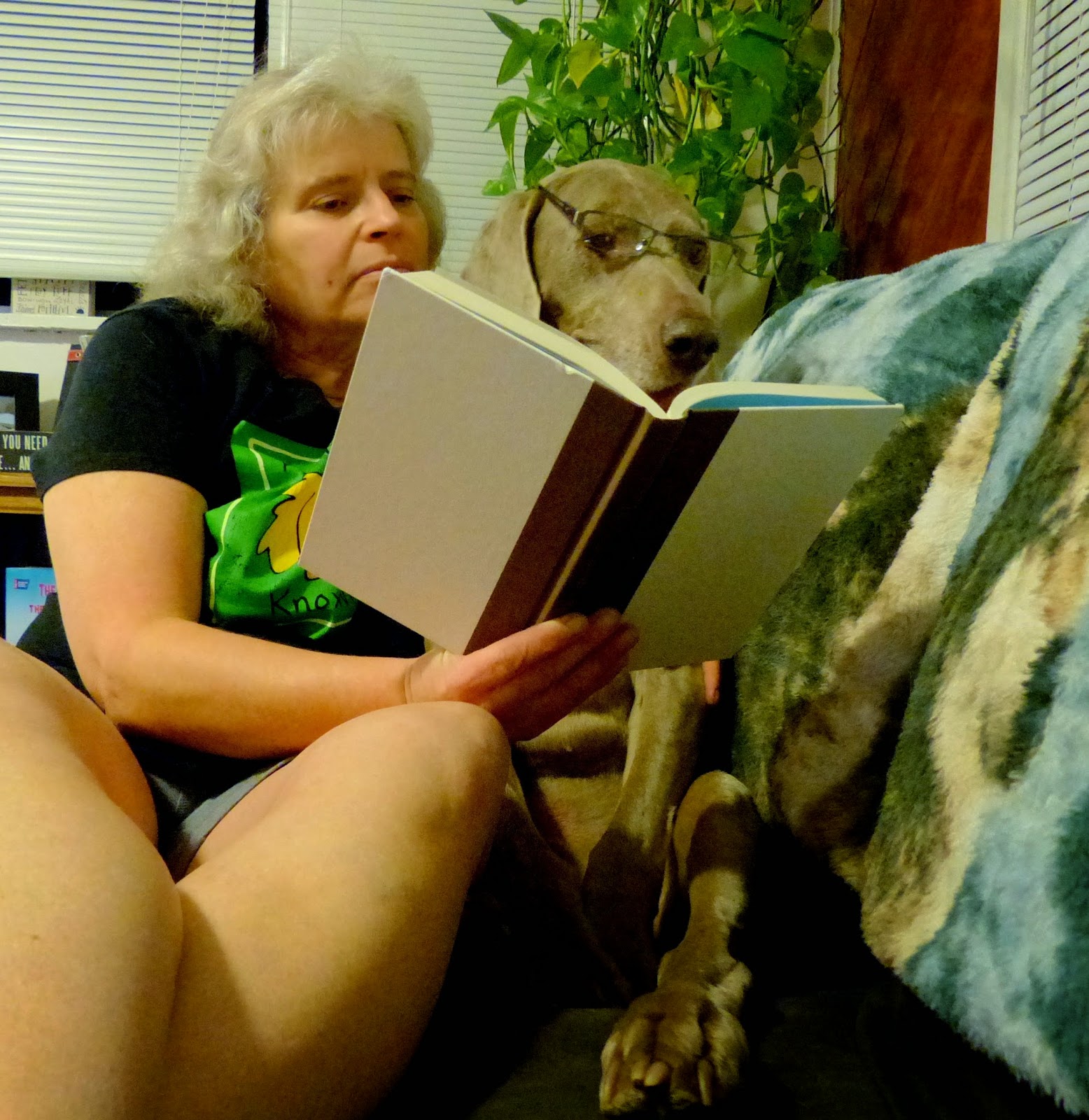Hello
Friend.
You
may remember on Sunday I was in deep thought as I looked out my front
window. I was think about Thanksgiving,
about the past, present and future. So
today I thought I’d give you a little message with a Thanksgiving theme. Of course I will scatter in some photos. Some of these photos are recent and some are
from the past. I even have some photos
of my buddy Bert when he was just a wee little pup and of course some of me and
my Golden Gal Pal Belle. (Oh and F&E just a warning Allred might show up in a photo.)
Brain
science has now discovered what The White Queen in “Alice in Wonderland” always
knew: "It's a poor sort of memory that only works backwards."
The
most recent research in cognitive science, which is a fancy name for the
science of “how the brain works,” reveals that remembering the past and
visualizing the future use the same neural mechanisms. Memory and prophesy are
flip sides of the same mental coin. Memory
works forward, and the very skills that enable you to remember your past enable
you to envision your future. To walk
down memory lane is, at the same time, to follow the yellow brick road into
your dream future.
In
Roman mythology there was a god known as “Janus.” Janus was believed to be the
god who was a guiding force for individuals at fresh starts, at new beginnings,
and at all times of transition. Janus
was always depicted as having two faces — one face looking backwards into the
past, the other face turned towards the future. Hence the hinge month of
“January.”
For
Christians to be “two-faced” was to be a prophet, except a prophet was seen in
threefold scenarios, not two. A prophet
was supposed to have three faces: a face oriented toward past, the present and
the future, simultaneously. A prophet
doesn't foresee the future. A prophet
sees the past, present and future at once and as one. For Christians this ability to bring together
the past, present and future is best represented not by Janus, but by Jesus.
It’s
Thanksgiving in the United States. Our
annual Thanksgiving holiday may be our most prophetic of all holidays. On one hand, Thanksgiving is all about
family, friends and tradition. Even though we are now a “fast-food” nation and
a “take-out” culture, Thanksgiving is the one day when we remember old recipes,
when we literally and intentionally “taste” our past and let the food tell the
story of our families and the Pilgrims and Native Americans.
Why
do we do this? Why do we make such a
huge investment in this short weekend holiday by traveling far and near to be
with family and friends? Because we want
to recall, remember, rekindle and rebuild family relationships. Thanksgiving is the time when we look around
the table and give thanks for our roots and our reasons for being together.

More
and more the big “draw” of the family get-together has a different
motivation. Over the last twenty years
“Black Friday” has grown from being a fun day of sales to being a seismic event
that determines the end-of-the-year economic health of major corporations. So crucial are the sales numbers racked up on
this coming weekend that stores have now slid down the slippery slope from
“Black Friday” to “Grey Thursday.” After
years of consciously trying not to “intrude” on the sacred “family holiday” of
Thanksgiving, retailers have now decided that “Black Friday” can legitimately
begin before the turkey gets cold on Thanksgiving Thursday. The “gathering together” for a bit of family
time at Thanksgiving has now become a “staging time” for an assault into the
shopping malls and big box outlets offering outrageous deals…if you get there
first.

So
what is Thanksgiving about in 2014? It’s
now 393 years after that “first Thanksgiving” harvest celebration shared by the
Native Americans and the new settlers in Plymouth. So what are we looking back at, and what are
we looking forward to? If remembering
and imagining are part of the same mental process, is Thanksgiving a time to
look back at family, friends and traditions and looking around the table at
ones we love? Or is Thanksgiving a time
when we take a deep breath of the past so we can and plunge into a future of
consumerism, obsessed with grabbing great deals for the upcoming Christmas
extravaganza?
In Ephesians 1:15-23
Paul writes to the Ephesian community but he makes his words applicable to all
who might receive it. It begins with a
profound expression of thanksgiving — and as with our twenty-first century
thanksgiving moment, it’s a two-faced, Janus type thanksgiving.
Paul’s
thanks are not directed backwards to the past and then forward toward the
future. Paul’s thanksgiving prayer is
directed outward and upward. It’s
directed “outward” to the community of disciples, to those whose faith has led
them to have a “spirit of wisdom” and a “heart enlightened.” Paul declares that the faithful know the
“hope to which he has called you” and so may revel in and reveal the “riches of
his glorious inheritance” — that is, a new life “among the saints.” His thankfulness is for the faith of those
who confess a commitment to Christ and live life based upon that commitment.

But
then Paul follows up that outward thanksgiving with an upward expression of
thankfulness and praise. Paul’s “thanksgiving”
is upwardly founded and outwardly grounded.
His outward gratitude could not be complete without his gratitude for
the upward divine grace that made such faith possible. Paul’s ultimate thankfulness is directed
“upward,” “heavenward,” toward the power, majesty, and beauty of God. Paul’s upward thankfulness is for the
revolutionary “change-up” that took place when Christ was raised from the dead
and redemption became a reality for all.
What
are we really thankful for this Thanksgiving?
Are you thankful that you get a four-day weekend off from school or
work? Are you thankful that you have a
warm home and a lovely meal to sit down to and enjoy with friends and
family? Thanksgiving is a strangely
laser-focused yet loosey-goosey holiday.
It’s defined with laser-like focus: a time to “give thanks.” But WHAT we give thanks for is left up to us.

When
family members and friends work hard all day to create a wonderful environment
— great food, warm place to gather — that is something to be thankful for. But the real “thankfulness” that Thanksgiving
should bring out in each of us is not a thankfulness for “things.” Thanksgiving is not about where we are, what
we are eating, or what our shopping strategy is for Friday. Thanksgiving must be rooted in a thankfulness
for the greatest relationship we have been given, a relationship with the
risen, regnant and returning Christ who calls the faithful to a “glorious hope”
and an illustrious “inheritance.”
Admit
it. Every family gathering includes some
we cannot wait to “embrace,” and some for whom we have to “brace.” Those whom we cannot wait to “embrace” are
those whose lives intentionally include and envelope others.
The
grandmother who always remembers to send a Birthday, Halloween, Valentine, and,
even though you are not Irish, a St. Patrick’s Day card and a little note meant
just for you.
The
distant cousin or friend who checks in on Facebook, knows what days are special
to you, and lets you know they know it.
The
little brother or sister who waits for your text every day, and you wait for
his or her reply. Those are the ones who
at Thanksgiving are easy to “embrace.”
The
“brace for” family members are not so easy.
Every family has those who are part of the family tree, but do not fit
into the family plan. But they are still
family. We welcome them with grace and
hospitality because they are family, but also because, as people of faith, we
know our “family” goes way beyond our genes and geography, I know my MOM’s does. Our “family” will always be who and where we
make it.
It
was probably goose or wild duck, not turkey, that was the centerpiece of that
First Thanksgiving. There would have
been fish present in the form of eels and various shellfish like lobster, clams
and mussels. Probably no salmon, just
like no sweet potatoes or cranberries at that first Thanksgiving (which I think
is a shame), although many people have made smoked salmon and salmon dip a
feature of Thanksgiving appetizers today.
You
know what? Salmon are either the most
brilliant or the stupidest creatures on earth.
Salmon babies, known as “fry,” hatch out in beautiful flowing fresh
streams of water. They have plenty to
eat and a safe place to live. Then they
leave. They travel downstream to escape
this nice, safe habitat, so that they might merge into larger streams, rushing
mighty rivers, and ultimately into the vast ocean.
Fresh-water
born salmon migrate to the salt-water environment of the ocean, a journey that
requires them to navigate hundreds of miles and requires them to completely
change their bodies. Fresh water salmon
fry become salt water salmon. For a
while.
And
then they “come home.” After spending
years being salt water creatures they finally and fully feel the pull of
home. They MUST go back. They journey through the ocean, go back into
the fresh water rivers, navigate through locks and dams and bears and eagles
and eager fishermen, and finally — a few of them — make it back to their family
table, to the place they were born and nurtured.
The
simple salmon “embraces” every part of its family heritage, at a huge, indeed
at an ultimate, cost. When we
intentionally gather together and regroup our families, it can also be
costly. It costs us our
independence. It costs us our self-made
identities. It costs us our personal
power and preferred placement.
We
become salmon. We join together and
become greater together, individuals with a new and vital future found in
company with others. Why? Because we
return to our roots even as we are looking towards the future. Because we dare to look both backwards and
forwards at the same time.
“And
I heard a voice from heaven saying, ‘Write, Blessed are the dead which die in
the Lord from henceforth: Yes, says the Spirit, that they may rest from their
labors; and their works do follow them” (Revelation 14:13).
What
“works” follow us into eternity? Not the
works of our hands, as in our mansions, our Mercedes, our monies, but the works
of our hearts, our deeds of love, beauty, truth and goodness. This is that for which we give thanks to God
this Thanksgiving. You know what giving
God thanks will get you? It gets you Grace. And you know where Grace leads you? It leads you to JOY, overwhelming joy.
Blessings,
Goose





























































